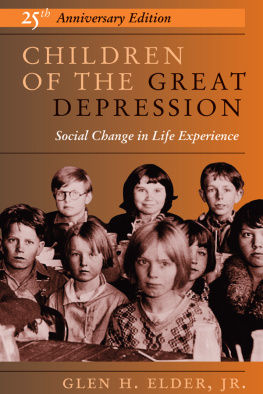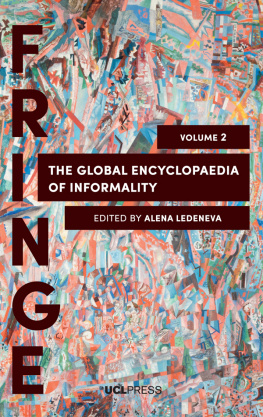Anna Z ilova
Andrzej Gretkowski
Alena Novotna
Elder and Social Changes
in Society
Reflection of research
Milano 2018
Editors
Anna Zilova, Andrzej Gretkowski, Alena Novotna
Anil John, Bellova Lucia, Domza Urszula, Domza Zbigniew, Gergel Milan, Gretkowski Andrzej, Kalesh Sruthy P., Kwiatkowska Sylwia, Lehoczka Lydia, Lipinski Stanisaw, Lizy P.J., Sisikova Katarna, Novotna Alena, Venus Joseph Mary, Zilova Anna, Zilova Veronika
Review
Beata Baloghova
Frantisek Dlugos
Julian Aulaytner
ISBN
Copyright
Editors
Anna Z ilova , Andrzej Gretkowski, Alena Novotna
Details of the Authors:
Anil John, Bellova Lucia, Domz a Urszula, Domz a Zbigniew, Gergel Milan, Gretkowski Andrzej, Kalesh Sruthy P., Kwiatkowska Sylwia, Lehoczka Ly dia, Lipin ski Stanis aw, Lizy P.J., Sisikova Katar na, Novotna Alena, Venus Joseph Mary, Z ilova Anna, Z ilova Veronika
Review
Bea ta Balo ghova
Frantis ek Dlugos
Julian Aulaytner
2018 EDUCatt - Ente per il Diritto allo Studio Universitario dellUniversit Cattolica
Largo Gemelli 1, 20123 Milan tel. 0272342235 fax 028053215
e-mail: editoriale.dsu@educatt.it (produzione); librario.dsu@educatt.it (distribuzione)
web: www.educatt.it/libri
Associato allAIE Associazione Italiana Editori
ISBN edizione cartacea: 978-88-9335-328-1
copertina: progetto grafico Studio Editoriale EDUCatt
finito di stampare nel settembre 2018
presso Litografia Solari Peschiera Borromeo (MI)
Introduction
The content of the submitted monograph can be framed by the following idea Getting old means to grow and to ripen. The old man is the one who lives in the community longer and knows many stories...(Holmerova and col., 2007, p. 59) and the thought of the Talmud book, Respect the old one even if he forgot everything due to old peoples weakness.
We present the results of research carried out in Europe (the Slovak Republic and the Republic of Poland) and in India (Kerala) to the scientific and professional community.
As a result of the development of the society, the demographic changes as the aging of the population in European countries and changes in the structure and size of families and due to other social and economic contexts, it is necessary to change the content and scope of the states social policy assuming that it is a state of social good, a welfare state.
One of the welfare state measures in the European frame is to create conditions for the care of the elderly according to their needs, both in the home care (field social work) and in the institutionalized care. We realize that the needs of old people are the same as for other citizens, but they also have their own specifics and sometimes the specific conditions of their fulfilment.
The monograph presents views of young people on the elderly, to the help to the older people, the solitude of the elderly, the violence against the elderly, some areas of social services for the elderly, the self-help groups in social work with the elderly, but also some demographic development of the population and others.
The aim of the publication is to share research findings, offer them for the implementation into practice, trigger a discussion, and also provide a stimulus for further research in this area.
An important goal is also to know the starting point in planning social measures, guiding social change and educating young, but not just young generations.
1.
The context of the pension system,
the demographic development and the reproductive behaviour of the Slovak population after 1990
The pension system in the Slovakia is based on three pillars following the 2004-2005 reform:
The mandatory defined-benefit pension scheme (1 st pillar) is administered by the statecontrolled Social Insurance Agency. It is financed primarily by pension insurance contributions paid by economically active citizens in the amount of 18% and/or 14% of the assessment base (gross wage), depending on whether they are enrolled only in the first pillar or concurrently in the first and second pillars.
There is an upper cap on the assessment base which is set at five times of the average wage. The minimum contribution period for pension entitlements is 15 years. The State pays contributions on behalf of specific groups, such as persons on maternity leave, persons taking care of children up to age 6 and carers of persons with severe disabilities. Contributions as well as pensions in payment are exempt from taxation.
In 2012, the Social Insurance Fund paid for disability, elderly and widows pensions 5.64 billion. eur , which makes 7.89% of gdp .
The mandatory defined-contribution funded pension scheme (2 nd pillar) is in operation since 2005 and that manages six private pension fund management companies: aegon , Allianz, axa , ing , Postova banka (until May 17, 2011 C sob ), vU b Generali. It has been operating since 2005, encompassing about 1.45 million people, 60% of people in economically active age. The level of assets reached in 2013 about 5.5 billion eur , which makes about 7.6% of gdp . Contributions to the second pillar are exempt from income tax.
The voluntary supplementary defined-contribution funded scheme (3 rd pillar) was launched in 1996. The private scheme is open to employees, self-employed and voluntary savers, who sign contracts with one of the currently four supplementary pension companies. ( axa, ing Tatry-Sympatia, Stabilita, Tatra banka). In 2012, in encompassed 447 thousand people, which is roughly a fifth people in economically active age.
Special social security systems cover so-called force departments, including soldiers, policemen, customs officers, firemen and rescuers. The schemes are administered by the Ministry of Defence and the Ministry of Interior. Financing comes from contributions paid by active members and direct State budget subsidies. Average awarded pensions are 1.5-2 times higher than pensions paid from the public pay-as-you-go scheme.
Since 2006 the government provides old-age pensioners, early retirement pensioners and disability pensioners with a Christmas pension bonus financed from the State budget. This benefit is not a component of the social insurance scheme, but a recurrent income support paid every year around Christmas to pensioners with pensions below 60% of the average wage in the economy (in 2012, up to a pension of eur 471.6). In 2012, the sum ranged from eur 38.69 to eur 66.39 based on the amount of the recipients pension (the higher the pension, the lower the bonus).
Statutory retirement age is set at 62 years for men and women. Due to an ongoing transitional period, however, women retired at age 57.5 to 61.5 years in 2013, depending on the number of children raised. As from 2017, the retirement age shall be linked automatically to the development of life expectancy. The automatic adjustment shall take into account changes in 5-year averages of life expectancy at the applicable retirement age. In line with expected longevity gains, the retirement age could increase by approximately 50 days per year. The obvious goal is to improve the long-term sustainability of the pension system.
Table 1: Retirement age projections (years)










